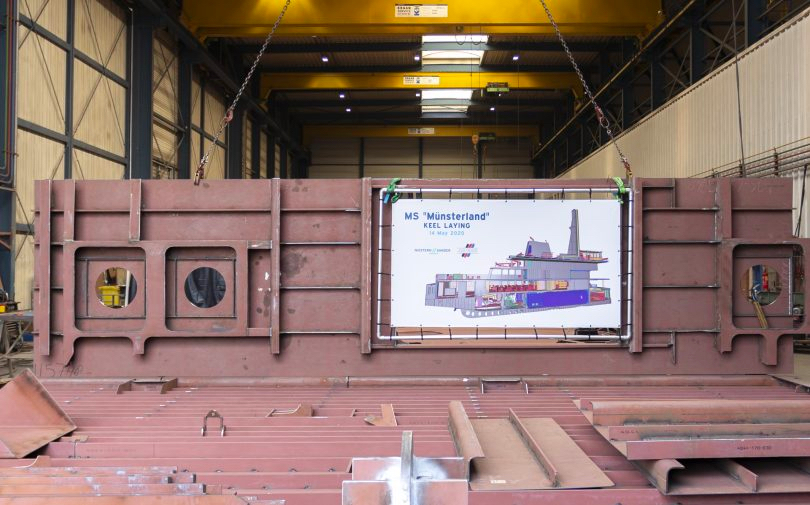Royal Niestern Sander has started section building for the LNG conversion of the passenger ferry Münsterland by laying the keel. The shipyard will design and build a completely new aft ship, including dual-fuel engines, LNG storage tanks, propulsion systems, all LNG installations, pipelines and other systems.
The new stern will replace the existing stern of the Münsterland. The yard has a specific conversion method in mind that offers the possibility of reducing the idle time of an existing ship – and therefore the loss of income – to a minimum. The yard also seeks to show that the space limitation when converting an existing ship is soluble.
Due to the combination of shipbuilding and ship repair, the majority of the conversion operation takes place physically at the ship construction site, whereby the repair dock is not yet needed. The Münsterland can continue to operate as usual during this work.
In 2015, shipping company AG Ems, owner of the Münsterland, started with two LNG ferries. MV Ostfriesland, a sister-ship of the Münsterland, sails between the german harbour Emden and the Wadden Island Borkum and the MV Helgoland from Cuxhaven to the island Helgoland. MV Ostfriesland was the first ferry in Europe to be modified with LNG technology while MV Helgoland is the first newbuild of its class in Europe. AG Ems was one of the first shipping companies to switch to LNG ship technology.
Second life
Thanks to the LNG conversion, emissions will be reduced significantly. The new shape of the stern will also reduce hull resistance. As a result, the ship needs less engine power to sail at the same speed, which means a reduction in fuel consumption and noise.
In addition to emission benefits, the LNG conversion also offers advantages in terms of material use. The existing ship dates from 1986 and has therefore, in theory, reached the end of its life cycle. Now, many technical systems are being replaced and upgraded giving the ship a second life. In practice, this doubles the lifespan of most of the ship and saves a lot of material. The old stern with old systems and installations will be dismantled by Niestern Sander and recycled as much as possible.
AG Ems will put the Münsterland back into service between the Dutch Eemshaven to the German Wadden Island Borkum in its new form at the start of the summer schedule at Easter 2021. The conversion project receives a contribution from the European Regional Development Fund of the European Union.








